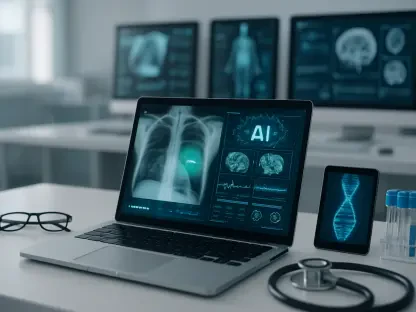The integration of artificial intelligence into healthcare stands at the forefront of technological progress, offering promising advancements but simultaneously posing regulatory challenges. With growing interest in AI’s potential to revolutionize healthcare, creating a robust policy framework is essential for harnessing its benefits safely. This analysis delves into the current landscape of AI policy development in healthcare, highlighting trends, expert insights, and future implications.
Current State of AI in Healthcare Policy
Data and Growth Trends
AI is increasingly woven into the fabric of healthcare, marked by steady adoption and innovation. Recent statistics from industry reports reveal that AI adoption in healthcare has risen sharply, with projections indicating sustained growth over the next few years. These data reflect AI’s ability to enhance diagnostics, innovate treatment methods, and streamline operational processes. Reports emphasize its evolution, noting AI’s capacity to address critical challenges like staffing shortages and resource allocation.
Real-World Applications and Examples
AI applications in healthcare showcase a diverse range of solutions aimed at improving patient outcomes. Cutting-edge examples include AI-driven diagnostic tools that promise quicker, more accurate diagnoses, and automated administrative systems that optimize resource management. Consider case studies from industry leaders, such as companies developing AI platforms for personalized medicine or automated imaging analysis. Such examples illustrate the scope and impact of AI in shaping modern healthcare and underscore its potential to transform routine practices and strategic initiatives.
Expert Insights and Industry Perspectives
Industry experts offer invaluable insights into AI implementation challenges and opportunities in healthcare policy. Professionals emphasize that AI’s promise is tempered by the need for comprehensive policy frameworks to ensure ethical data use and prevent bias in AI algorithms. Thought leaders advocate for collaborative approaches, urging healthcare systems, policymakers, and technology companies to develop unified standards that promote transparency while fostering innovation. These expert perspectives illuminate both current challenges and potential pathways for AI policy advancement, highlighting the importance of cross-sector collaboration.
Future Outlook and Implications
AI policy development in healthcare is poised for significant evolution, with implications that resonate across the industry. As AI technologies advance, the need for more refined policies will continue to grow, focusing on both safety and scalability. Future developments may see AI enhancing precision medicine and predictive analytics while presenting regulatory and ethical challenges. The broader implications encompass improved patient care, boosted efficiency, and transformative potential, but careful consideration of risks and robust oversight remain critical to successful implementation. This evolving trend demands balanced policies that accommodate rapid technological growth without compromising safety.
Conclusion
In wrapping up this analysis, AI policy development in healthcare demonstrates pivotal potential to redefine industry standards. A collective approach to policymaking lays the groundwork for transformative opportunities, aligning with AI’s capability to address healthcare inefficiencies without undermining ethical responsibilities. Challenges notwithstanding, the implementation pathway recognizes AI’s revolutionary potential, guiding future policy measures toward responsible and impactful integration. Insights from the analysis inspire forward-thinking strategies in healthcare, setting the stage for a sustained focus on AI policy refinement and innovation.









